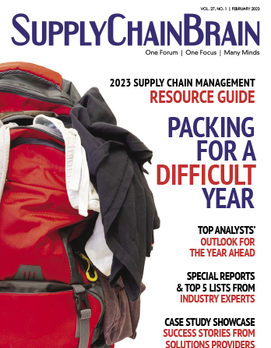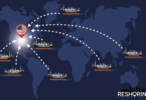
Home » Heavy-Equipment Maker Tears Down Functional Silos With a Digital Twin
CASE STUDY
Heavy-Equipment Maker Tears Down Functional Silos With a Digital Twin

August 1, 2022
Manufacturing supply chains that consist of multiple independent partners are by their nature a challenge to operate. But vertically integrated entities can be no less difficult to manage.
E.D. Etnyre & Co. is a 123-year-old family-owned maker of heavy industrial equipment used mostly for road maintenance and preservation. Based in Oregon, Illinois, the company builds product virtually from scratch, performing everything from cutting steel to machining, painting and final assembly.
One might assume that doing all those tasks in-house would mean Etnyre has easy access to all related data. Until recently, though, that was far from the case.
Veteran companies often are running on antiquated information systems. In Etnyre’s case, that meant supporting applications that were several decades old, many of them homegrown and created to address narrowly defined needs.
“We were good at taking in data, but not good at sharing it or giving it back to the end user in a way that allows you to make good decisions,” recalls Justin Nelson, senior director of I.T. and corporate strategy with Etnyre International Ltd. (That unit oversees multiple brands, including Rayner Equipment Systems, Bearcat Manufacturing and E.D. Etnyre.)
Drawing on a mountain of data, Etnyre could assess where it stood at certain milestones, such as the end of a financial period. But weekly or daily status reports about production schedules and parts availability eluded the company. “Those systems were very siloed operationally,” says Nelson. “Different parts of the business couldn’t see data that was relevant to them.” if
Etnyre couldn’t just swap out all 15 or so legacy systems overnight, in favor of a shiny new I.T. infrastructure that spanned all functions and departments. “There was definitely an urgency,” says Nelson. The company needed to acquire immediate decision-making power, while reserving the option of changing out the old systems at a later date.
Etnyre turned instead to Tada Cognitive Solutions, provider of a single digital platform for company-wide visibility and collaboration. Tada’s application sits atop Etnyre’s existing systems, drawing input from from all of them and outputting it “in easily digestible bits of decision-making data so that people could see and share it across the business,” Nelson says.
The Tada platform builds a digital twin of the customer’s entire organization, layering it on top of multiple applications, says Paul Singh, the vendor’s chief revenue officer. “Even though they had their own version of an ERP [enterprise resource planning system], they wanted the unique opportunity of a digital twin that connected not just their ecosystem’s siloes, but also those of their partners — their dealers and outside networks,” he says.
It took about six months to validate all relevant data, some of which was accessible to Etnyre for the first time. But primary views of major pain points, relating to operations and the supply chain, were available within two months. “Complexity didn’t come from delivering the data,” explains Nelson. “It was getting it into a form where it could start to be used.”
Tada quickly brought on additional functionality, overseeing such key areas as inventory, sales and marketing, and human resources. “We were able to tie it all together for an executive viewpoint,” says Rohan Parambi, Tada’s director of emerging markets, dealerships and mid-sized businesses.
The digital twin provided Etnyre with both a current state and historical map of production, generating “what-if” scenarios that prepared the company to deal with unanticipated production shortages or demand surges. “It allows them to move people, parts and products around,” says Parambi.
With the Tada platform in place, Etynre was able to move away from “a period-end rear-view mirror focus,” Nelson says. “It’s enabled us to make data-driven decisions. And it’s facilitated a cultural transformation, where silos go away and functional areas are talking to one another.”
From Tada’s perspective, “we saw an extremely positive partner to learn and build with,” says Parambi. “Etnyre was able to create visibility into every aspect of their business, through the supply chain, factory floor, production and sales, that was factual instead of gut-based or hypothetical.”
For Etnyre, says Parambi, Tada’s focus now is on connecting the manufacturer to outside partners in procurement and the supply chain, as well as dealerships. Nelson adds that Tada is helping the company to start thinking about applying analytics, machine learning and artificial intelligence to enable predictive learning, and “anticipate trends based on what the data is telling us.”
“This is a partnership,” adds Nelson. “It was never intended to be a one-time purchase of discrete functionality.”
Read more: 100 Great Supply Chain Partners of 2022: Weathering the Storm Together
RELATED CONTENT
RELATED VIDEOS
Subscribe to our Daily Newsletter!
Timely, incisive articles delivered directly to your inbox.
Popular Stories

2023 Supply Chain Management Resource Guide: Packing for a Difficult Year
VIEW THE LATEST ISSUECase Studies
-
JLL Finds Perfect Warehouse Location, Leading to $15M Grant for Startup
-
Robots Speed Fulfillment to Help Apparel Company Scale for Growth
-
New Revenue for Cloud-Based TMS that Embeds Orderful’s Modern EDI Platform
-
Convenience Store Client Maximizes Profit and Improves Customer Service
-
A Digitally Native Footwear Brand Finds Rapid Fulfillment



